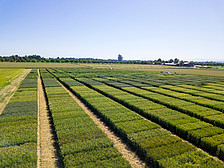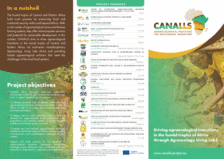Concept & Objectives
Concept
The CANALLS project aims to drive agroecological transitions in the humid tropics of Central and Eastern Africa through multi-actor, transdisciplinary Agroecology Living Labs (ALLs). These ALLs serve as platforms for co-creating and implementing sustainable agricultural practices tailored to local contexts. By engaging over 20,000 farmers and value chain actors across eight ALLs in the Democratic Republic of Congo, Burundi, Cameroon, and Rwanda, the project seeks to enhance food and nutritional security, promote biodiversity, and foster sustainable development.
Objectives
- Establish and operate eight Agroecology Living Labs (ALLs) in Central and Eastern Africa.
- Co-create and implement agroecological practices focusing on key crops such as cocoa, coffee, cassava, rice, and maize.
- Develop a holistic assessment framework to evaluate the socio-economic and environmental performance of agroecological practices.
- Build capacity and share knowledge through practice abstracts, replication guidelines, and policy recommendations.
- Deliver fair, inclusive, and sustainable business models, along with services and tools to facilitate market access and enhance demand for agroecological products.
- Leverage EU-AU cooperation to conduct transdisciplinary research and drive coordinated action for agroecological transitions.
Project Partner
- Centre de Coopération Internationale en Recherche Agronomique pour le Développement (CIRAD), France
- International Institute of Tropical Agriculture (IITA), Nigeria
- Universität Hohenheim, Germany
- Norsk Institutt for Bioøkonomi (NIBIO), Norway
- Q-PLAN International Advisors PC, Greece
- Rikolto International, Belgium
- Université Catholique de Bukavu, Democratic Republic of the Congo
- Association Paysanne pour le Développement Intégré au Sud-Kivu, Democratic Republic of the Congo
- Institut de Recherche Agricole pour le Développement (IRAD), Cameroon
- Société Coopérative avec Conseil d'Administration pour le Manioc, Cameroon
- Institut des Sciences Agronomiques du Burundi (ISABU), Burundi
- Rwanda Agriculture and Animal Resources Development Board (RAB), Rwanda
- COPED Ltd, Rwanda
- Maggot Farm Production Ltd, Rwanda
- African Forum for Agricultural Advisory Services (AFAAS), Uganda
- Naturland – Verband für ökologischen Landbau e.V., Germany
- Eidgenössische Technische Hochschule Zürich (ETH Zurich), Switzerland
- African Agricultural Technology Foundation (AATF), Kenya
- Confédération des Associations des Producteurs Agricoles pour le Développement (CAPAD), Burundi
- GASD Services SARL, Democratic Republic of the Congo
- Institut National pour l'Étude et la Recherche Agronomiques (INERA), Democratic Republic of the Congo
- Cameroon Forum for Agricultural Advisory Services (CAMFAAS), Cameroon





